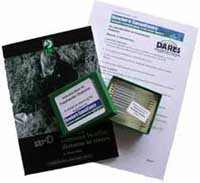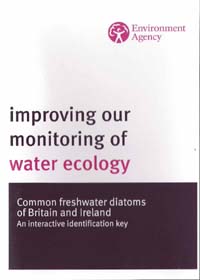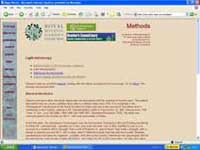Diatom training course
Bowburn Consultancy offer training in algal identification and ecology, focussing on ecosystem health and assessment. In particular, we offer a unique distance learning course, Introduction to Freshwater Diatoms, a complete, interactive course on how to identify diatoms.
This course was first developed in 1995 and has been used to train over 200 biologists in the Environment Agency, SEPA, universities and consultancies in the whole range of skills necessary to use diatoms for assessing freshwater quality. The current version is the third revision of the course, incorporating both comments from previous students and the latest developments in the field, relevant to the Water Framework Directive.
Students receive prepared slides plus tutorial notes from which they learn the basics of diatom identification. They also perform a series of exercises in which they learn how to collect, prepare and analyse samples from their own region, allowing the learning experience to be tailored to local circumstances. A variety of media are used during the course, including internet, an interactive CD-ROM, videos and traditional printed keys and tutorials.
Pre-requisites
No formal qualifications are assumed, although practical experience in a biology laboratory is necessary (e.g. for correct use of high power microscopes, safe handling of chemicals etc). Most people who do the course have at least a BSc, but this is not essential if candidates have relevant experience.
Features

- All participants receive a set of 12 slides and six modules containing tutorials and exercises to
develop skills in diatom identification along with collection, preparation and analysis of samples and the
AIDGAP key ‘Identification of Common Benthic Diatoms in Rivers’.
- Full tutorial support is included in the price – by e-mail or telephone.

- Several exercises make use of the new CD-ROM ‘Common Freshwater Diatoms of Britain and Ireland: An
Interactive Identification Tool’ (not included in price)

- Students also have access to a web-based tutorial on digital microscopy and imaging as well as a variety of supplementary materials on a range of topics, from calibration of eyepiece graticules to drawing diatoms.
- A one-day workshop is an integral part of the course, providing a mix of activities to allow ‘hands-on’ demonstrations of methods, briefings and opportunities for participants and tutors to ‘trouble-shoot’ any problems that arise.
student workload
Experience with earlier versions of the course has shown that students work through materials at different paces and it is difficult to give an accurate assessment of the time taken to complete all the exercises. Some complete it in less than two weeks; others take longer. The median effort is 84 hours.

